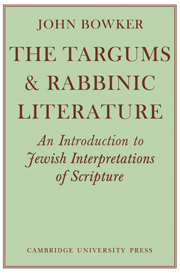Book contents
- Frontmatter
- Contents
- Preface
- Acknowledgements
- Note on the 1979 reprint
- Note on transliteration
- Note on bibliographical references
- List of abbreviations
- INTRODUCTION: THE BACKGROUND OF THE TARGUMS
- PS. JONATHAN ON SELECTED CHAPTERS OF GENESIS
- GENESIS I
- GENESIS II
- GENESIS III
- GENESIS IV
- GENESIS V
- GENESIS VI
- GENESIS VII
- GENESIS VIII
- GENESIS IX
- GENESIS X. 8–14
- GENESIS XI. 1–9, 27–8
- GENESIS XIII. 10–13
- GENESIS XIV. 13–15, 18–20
- GENESIS XV. 1–6
- GENESIS XVI. 1–6
- GENESIS XVIII. 1–25
- GENESIS XIX. 24
- GENESIS XX. 13
- GENESIS XXI. 1–2
- GENESIS XXI. 33
- GENESIS XXII
- GENESIS XXVI. 5
- GENESIS XXXVII
- GENESIS XXXIX
- GENESIS XL
- GENESIS XLI
- GENESIS XLII
- GENESIS XLIII
- GENESIS XLIV
- GENESIS XLV
- GENESIS XLVI
- GENESIS XLVII
- GENESIS XLVIII
- GENESIS XLIX
- GENESIS L
- Appendices
- Bibliography
- Indexes
- Frontmatter
- Contents
- Preface
- Acknowledgements
- Note on the 1979 reprint
- Note on transliteration
- Note on bibliographical references
- List of abbreviations
- INTRODUCTION: THE BACKGROUND OF THE TARGUMS
- PS. JONATHAN ON SELECTED CHAPTERS OF GENESIS
- GENESIS I
- GENESIS II
- GENESIS III
- GENESIS IV
- GENESIS V
- GENESIS VI
- GENESIS VII
- GENESIS VIII
- GENESIS IX
- GENESIS X. 8–14
- GENESIS XI. 1–9, 27–8
- GENESIS XIII. 10–13
- GENESIS XIV. 13–15, 18–20
- GENESIS XV. 1–6
- GENESIS XVI. 1–6
- GENESIS XVIII. 1–25
- GENESIS XIX. 24
- GENESIS XX. 13
- GENESIS XXI. 1–2
- GENESIS XXI. 33
- GENESIS XXII
- GENESIS XXVI. 5
- GENESIS XXXVII
- GENESIS XXXIX
- GENESIS XL
- GENESIS XLI
- GENESIS XLII
- GENESIS XLIII
- GENESIS XLIV
- GENESIS XLV
- GENESIS XLVI
- GENESIS XLVII
- GENESIS XLVIII
- GENESIS XLIX
- GENESIS L
- Appendices
- Bibliography
- Indexes
Summary
And Cush begat Nimrod: he began to be mighty in sin and to rebel before the Lord in the earth.
He was a mighty rebel before the Lord: wherefore it is said: from the day in which the world was created there has not been any like Nimrod a mighty hunter and a rebel before the Lord.
And the beginning of his kingdom was Babel the great and Hadas and Nezibin and Qtesiphon in the land of Pontos.
Out of that land Nimrod went forth and ruled in Athur, because he did not wish to enter into the counsel of the generation of the divisions. And he left those four cities, and the Lord settled him elsewhere instead, and he built other towns, Nineveh and the town of Pelatyath and Hadyath,
and Telasar which was built between Nineveh and Hadyath, itself a great town.
And Mizraim begat Nivytai and the Maryutai and the Livyqai and the Pentaskinai
and the Nasyutai and the Pentapolitai from whom went forth the Philistines and the Qaphodiqai.
Selections from other Targums on Genesis x. 8–14
Parts of verses 10, 11, 12, 13 and 14 occur in F. T. (Gins. pp. 8, 75, 93). T.O.: see the notes below.
Notes on Genesis x. 8–14
The evil character of Nimrod is not specifically stated in Genesis, and some sources (for example Syr. Comm.) did not regard him unfavourably.
- Type
- Chapter
- Information
- The Targums and Rabbinic LiteratureAn Introduction to Jewish Interpretations of Scripture, pp. 179 - 181Publisher: Cambridge University PressPrint publication year: 1969



